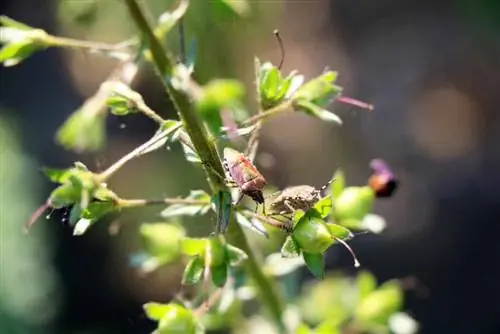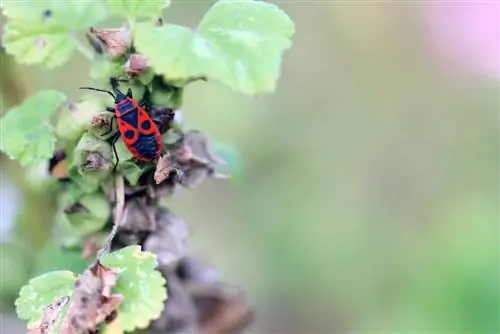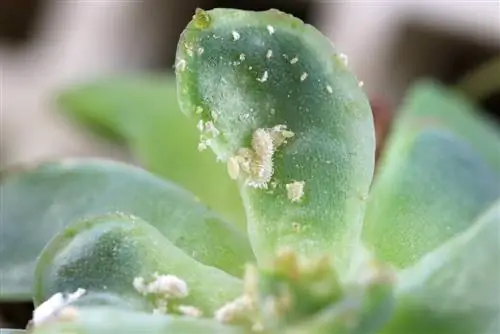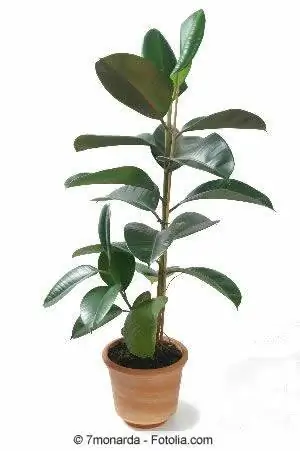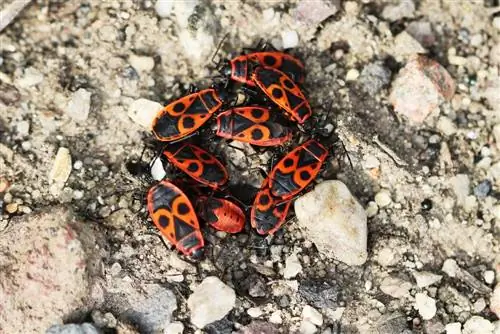- Author admin [email protected].
- Public 2023-12-17 03:39.
- Last modified 2025-01-24 12:45.
Leaf bugs are so unpopular with hobby gardeners because some of the varieties are harmful to garden plants because they suck out the plant sap and leave behind misshapen fruits and holed leaves. Due to the toxins released, the plants can no longer form new shoots and end up withering away. Some of the hundred or so varieties of leaf bugs have specialized on certain plants, others spread an unbearable stench when touched. However, the fight against the different species is the same.
Detect infestation
Sheaf bugs are classified as harmless to humans and animals because they do not pose any particular threat from possible toxins or other incompatible substances. But plants are at risk and the bugs can transmit diseases that can harm them, but not humans. Leaf bug infestations are easy to recognize. Because beetles and larvae feed on the plant sap, which of course damages the plants and the infestation becomes visible:
- affected plants suffer from pitting, not just on the leaves
- Garden flowers and trees are often attacked
- Injection sites on stems and leaves discolored brownish
- still stunted shoot tips, fruits or flowers
- unopened buds, only half-opened flowers
- Leaf tissue ripped open
- The leaf bugs multiply especially in dry, very warm to hot weather
- unbearable smell in the garden due to stink bugs
- through the use of the stink bugs' stink glands, the infected fruits become inedible
Tip:
All types of soft fruit, strawberries, apple and pear trees as well as cherries, various vegetables such as cabbage or beans and potatoes but also ornamental shrubs, roses, perennials and potted and balcony plants are particularly at risk of an infestation.
Prevention
Since the leaf bugs especially love dry conditions, the garden should be watered regularly, especially in very hot and dry periods in summer. It is good if the soil remains moist throughout. Anyone who has a garden pond can be happy because all kinds of amphibians, such as toads and frogs, can live here as natural enemies of bedbugs. Attracting and settling a wide variety of birds in the garden, for example by hanging many nesting boxes in the trees, also prevents leaf bug infestation. Further tips for prevention:
- Sheet bugs overwinter, so they look for warm places
- They are often found indoors in winter
- collect and dispose of these copies immediately
- If the temperature is below zero they can also be put outside because they cannot tolerate the cold and will die
Tip:
If the first leaf bugs are found in the garden with the first rays of sunshine in spring, they should be collected immediately. This means they cannot reproduce unhindered in the next few weeks. If the pests sense danger, they drop from the plant and play dead. This way they can easily be picked up.
Shake off or read leaf bugs
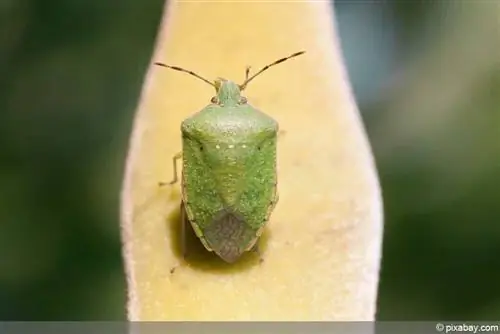
There are various home remedies that can be used to combat leaf bug infestations, although some of them are not entirely safe for the affected plants. Shaking the pests off the leaves in the early hours of the morning is therefore completely safe for the garden. This can be very effective, especially in spring when the nights are still cold. Because the bugs are still stiff from the cold of the night and cannot move as quickly. This means they can easily be picked up from the ground and disposed of.
Tip:
When picking up the bugs, you should always wear gloves, as it can happen that there are stink bugs among them, which will spread their unbearable stench in order to protect themselves. To prevent the smell from sticking to your hands, rubber gloves are recommended.
Use neem oil to combat
Neem oil has many positive properties and is harmless to plants and animals, but above all to people. But it can be used effectively against many harmful insects. Neem oil is obtained from the neem tree, which is native to India, and is therefore available in finished products in well-stocked specialist retailers. If the leaf bugs are sprayed with the oil, they stop their activities that are harmful to the plant and thus stop eating. No more eggs are laid and therefore no more offspring are produced.
Make soapy water
A good remedy against many pests, including leaf bugs, is homemade soapy water. To avoid damaging the plants, you should not use conventional soaps or detergents when preparing the solution, but proceed as follows:
- liquid soft soap without additives is mixed with water to form a lye
- Splashes of spirit can also be added for better effectiveness
- The affected plants are sprayed several times a day
Tip:
When working with soapy water, it makes sense to spray it directly onto the respiratory organs on the head of the leaf bugs so that they are prevented from breathing and suffocate.
Use chemical agents
If the infestation of leaf bugs in the garden is very high and cannot be contained using natural remedies, then chemical treatment must be used. But commercial chemical products are always a major interference with nature and can therefore harm the entire garden. Above all, hobby gardeners who ultimately decide to use chemical products should always follow the manufacturer's instructions exactly and not, for example, overdose. Products against various pests such as lice of all kinds, cicadas, larvae, caterpillars or other sucking insects are particularly recommended here. These are available either in the form of spray, sticks for the soil or granules that are added with the irrigation water. In addition to paraffin oil, the active ingredient thiamethoxam has also proven effective. Since this product is also very harmful to the environment, for example against bees or aquatic organisms, it must be used extremely carefully.
Paraffin oil
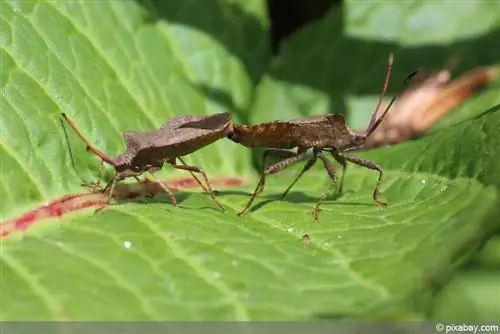
Paraffin oil is generally used to preventively combat eggs and larvae of pests. It consists of several hydrocarbons obtained from petroleum and is therefore a chemical agent. Paraffin oil can be used especially when leaf bugs are infested on fruit trees. The application proceeds as follows:
- spray affected plants
- the pests suffocate when the oil forms an airtight layer around them
- has a relatively high environmental compatibility
Tip:
Unfortunately, paraffin oil not only fights leaf bugs, it can also harm beneficial insects such as ladybirds.
thiachloprid
Another insecticide that is often used, especially in hobby gardens, is one with the active ingredient thiacloprid. It helps against sucking insects, which also include leaf bugs. The active ingredient is mainly available commercially as a spray, which is relatively harmless, especially for bees.
Conclusion
Sheaf bugs prefer areas where it is very hot and, above all, dry. Frequent watering so that the soil always remains moist is one of the best preventions against the pests. A pond with frogs or toads also offers relief. Hobby gardeners who offer birds plenty of shelter and nesting places in a natural garden can also score points against leaf bugs, their natural predators. If your home garden has been infested, home remedies such as soft soap or collecting the pests can help. Only in a last resort should you use chemical agents such as paraffin oil to combat bedbug infestation, as these not only destroy the pests, but can also harm the garden as a whole.

